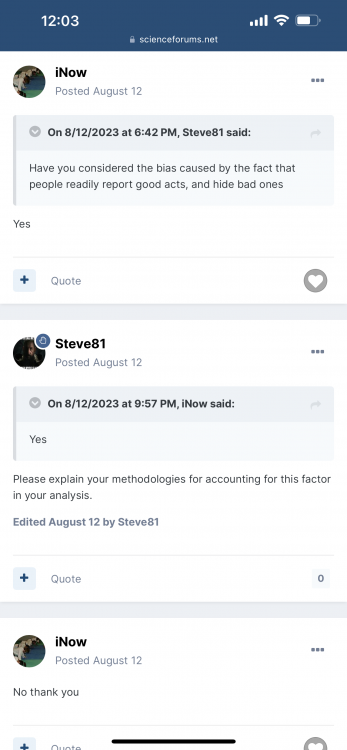-
Posts
294 -
Joined
-
Last visited
Content Type
Profiles
Forums
Events
Everything posted by Steve81
-
No worries. Here is what Google has to say on happiness. Happiness Definition | What Is Happiness (berkeley.edu) What Is Happiness and How Can You Become Happier? (verywellmind.com) Self-Worth: 4 Ways to Improve Your Self Esteem - The Berkeley Well-Being Institute (berkeleywellbeing.com)
-
Brain injury? Sure, but I wouldn't want to go that route, would you? I have abused narcotics extensively in my past. They make you feel good for a time, but they don't make you happy. They simply make it such that you don't mind being sad. Sex? Not really. It's enjoyable no doubt, but in and of itself, it's meaningless. Food when hungry, water when thirsty? Those are in the guidelines too, as needs. But merely fulfilling one's basest needs isn't enough to achieve happiness. That's merely surviving.
-
Fundamentally, self-worth, and being comfortable with who you are. The "guidelines" do lot to promote that, along with other factors. Being kind and helpful to others tends to build self-worth, both because we often get positive feedback for doing so, and because we can feel like we give things a good faith effort. Learning tends to build self-worth. I feel stronger learning something new, like when @Genady taught me something I didn't know about black holes. Engaging in what I'm doing focuses me, and makes me less error prone, which is helpful for self-worth. Apologizing and admitting you were wrong sometimes takes great strength, and can build self-worth if you realize it. Not dwelling on your mistakes is helpful for self-worth. To turn the question on its head, if you don't think you are worth anything, how could you ever possibly be considered happy?
-
I have not. I will research.
-
When it comes down to it, it's a basic matter of self-worth. I know of no way to quantify that scientifically. What I can say is that prior to a few months ago, I despised myself. I couldn't even tell my therapist what love was, because I didn't love myself, never mind anybody else. Everything was transactional; I did things to suit my particular purpose. I wrote for an A/V website solely to get my name out there, and accepted a pittance of a wage in doing so. At some points in my life, I was so overcome with depression I could barely get out of bed to eat. Taking care of my basic needs just didn't matter. I poisoned myself with foods I knew my body couldn't tolerate. I just didn't care. You can take that story to its logical conclusion; I don't need to say any more. Today, I'm happy with the man I am; I can accept my faults, even if I wish to improve upon them. I'm a peaceful man, but I won't let someone else walk all over me. I found to appreciate people for the gifts that they do have, and accept their flaws as well, learning how to love others. I'm driven, passionate (to a fault at times), and I enjoy conversing with other people to learn about their stories, both because it fascinates me and because I learn to understand them. Suffice it to say, it's been a fascinating transition. I hope this satisfactorily answers your question, but if it doesn't, feel free to ask whatever you care to ask, and I will do my best to answer.
-
I’m not trying to evade them; psychology is its own discipline, and that’s been my focus. If you want to help me link psychology with measurable evidence though, I’m game for that. The art of psychology mostly blows as it is. Just don’t expect me to submit to a spinal tap 😝
-
Thanks for the replies @CharonY and @Peterkin!
-
Checking for chemical imbalances in the brain I suppose, but not sure how you’re supposed to accomplish that in a non-invasive manner. I know something about psychology; I know far less about neurology. Possibly true. My BP was well within normal parameters in spite of the kidney stone.
-
Happiness is just a state of mind. I don’t need much in the way of material objects to get there. Give me a balloon, and I can play with my sons for hours. That brings me joy, and adds to my happiness.
-
Without some kind of actual observation other than a personal pet theory, what am I supposed to make of your statement? When you observe cold fusion, let me know.
-
IMHO, that’s part of being “happy” as opposed to feeling joy or excitement. Not every moment is some great pleasure, but on balance, I’m having good days, every day, even the day I had a kidney stone.
-
I’d need a proof of concept to believe any of this personally. In conventional experimental fusion reactors, AFAIK they’re using lasers to fire up confined hydrogen isotopes to very high temperatures to achieve the conditions needed for fusion, and basically just waiting for the (incredibly small) nuclei to collide and fuse. They’ve actually achieved nuclear fusion in under these circumstances, indicating contrary to your statement, that temperature is a pretty big factor. Everything you wrote reads like a bunch of pseudoscienctific gibberish to be quite honest.
-
I’m the guy that taught you what reporting bias is. I hope you get that epic chip off your shoulder some day. Bye. Thanks! Would it still be considered informed consent if they didn’t read it, and it was just buried somewhere in the terms and conditions? Or does it have to be patently obvious?
-
I didn't propose we research rudeness; I proposed a scenario in which research was being conducted on rudeness, and asked what the ethical implications were. Is there a particular problem you have with me that you'd like to discuss in private? If not, perhaps it’s just best to ignore each other going forward to avoid conflict/misunderstandings.
-
With respect to the first section of your post, it's a hypothetical scenario; use whatever answers you're comfortable with. Unfortunately, the link isn't that helpful. What information is relevant, and what isn't, with respect to getting subjects to participate in such a trial? That's my question. This isn't a simple drug trial, where the risks are readily explained without affecting the research itself. What risks are there of basically observing people interact in their public and anonymous private communications in the first place? How does informed consent happen, by announcing that we’re doing a study on human behavior, without making people suspicious of the anonymous negative comment feature? If that isn’t possible, it’s no wonder there’s so little hard data in psychology.
-
I appreciate the kind response; how specific would the consent need to be, such that we don’t bias the results? No profit would be involved in this endeavor one way or the other.
-

TFG or That Florida Guy? Either way, can the GOP win in 2024?
Steve81 replied to Phi for All's topic in Politics
Tell your elected representatives; that's how we effect the change we want to see. Re: Biden, I saw him speak during the mid-term election cycle. He's not exactly a senile old fool like some people like to portray. He's not as good as say, Jamie Raskin, in terms of oratory, but he was sufficient to take on Trump IMHO. -
Let me offer a scenario. I moderate a forum elsewhere, and in a prior software version, there was a reputation similar to that here. Users could upvote and downvote others; negative feedback was anonymous. In addition, users could add a comment to their feedback. As a moderator, I one day stumbled upon the database that had ALL the negative comments, and who had sent them to whom. If this data were analyzed, would that be an ethical violation? If a forum were specifically set up in a similar manner to see how rude people could be towards one another, would that be an ethical concern?
-

TFG or That Florida Guy? Either way, can the GOP win in 2024?
Steve81 replied to Phi for All's topic in Politics
To offer a few thoughts, the best way to deal with the likes of Trump is to directly address the concerns of his base, and explain it to them in understandable terms what is being done about their problems. A couple thoughts come to mind... 1. The opioid epidemic. Emphasis mine. Is it any wonder these folks might not trust vaccines from pharmaceutical companies? And let's talk about that "massive" settlement to punish the pharmaceutical manufacturers. -
I agree, that’s why I address things like physical and socioeconomic needs in the guidelines. We can’t be happy if those aren’t met. It’d be like expecting your computer to run an analysis for you without electricity. Indeed. Some problems are unfixable, at least until scientists like yourselves find out the cause and determine a cure. All I did was examine Silvan Tomkins’ list of primary affects, and combine that with knowledge regarding neurochemical releases when we’re kind to others. I then simply developed a patch, by altering human behavior, to address hardware/software compatibility issues. In my experience, though anecdotal, people are nicer than some give them credit for. Yesterday alone I had three positive experiences. In the morning, I took my car to get an oil change. The technician was a bit gruff, but professional. His daughter was also hanging out in the shop. I remarked that I also had kids, and a conversation developed. Eventually it turned to his desire to be a graphical designer. He was concerned about the cost of a computer to reach that goal was untenable; I suggested looking for a cloud-based service, as that would offload all the computing requirements on to the service provider, reducing his up front cost considerably. By the time I left, we were giving each other fist bumps. Later in the morning, I was on a stroll, and I saw a gentleman washing and waxing his car; this was an older Acura Integra, which had obviously been very well kept. I commented that it was a nice car, and ultimately he let me peek at his Recaro racing seats, JL audio system, etc. He mentioned that he kept the power train stock, and when queried, that he loved the boost of the VTEC engine when it switched cams as revs shoot up. My final experience was a little more mundane. I was getting a sandwich, and being friendly with the staff at Jersey Mike’s. As my order wrapped up, the gentleman finishing my sandwich asked if I’d like anything else. I joked that I’d eat the whole tub of bacon he had in front of him; he checked to make sure no one else was looking and added a few strips to the order, on the house. 😆 That’s just one day.
-
FWIW, my wording wasn’t to suggest a fear of errors, but to suggest the purpose, i.e., minimize (and then subsequently mitigate) the affect of shame-humiliation. I like your wording as well.
-
Hence why they’re guidelines and not ironclad laws. 🙃
-
The guide is for your own happiness. It does not apply to people with gross genetic defects, but in the context of a therapist-patient relationship, could conceivably be used to heal from past trauma.
-
To get the ball rolling... 1. Be kind, compassionate, and helpful in your interactions with others. 2. Broaden your horizons and study the subjects that interest you. 3. Try new things and engage in the activities which bring you joy. 4. Do not suffer in silence. When you are in need, ask for assistance. 5. Remain engaged in what you are currently doing to minimize errors. 6. When you do make an error, sincerely apologize, and learn from your mistakes. 7. Learn to laugh at your errors instead of dwelling upon them. 8. Engage in mindfulness exercises to help you relax. 9. Take care of your physical and socioeconomic needs. Add other ideas as you see fit, so long as they follow the path of least harm.



